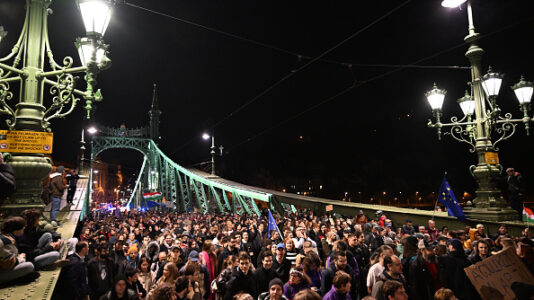After five opposition MPs in Hungary’s National Assembly were slapped with a fine of more than HUF 70 million (€170,000) by Speaker László Kövér for protesting the Pride vote, Kövér has now filed a criminal complaint against them at the Prosecutor General’s Office.
The speaker took action against the Momentum party MPs after they lit flares in the National Assembly in protest of a law meant to ban Pride last month. The MPs claim the law would not only make it impossible to hold the Budapest Pride parade in its current form but also restrict the right to free assembly in general, i.e., create a slippery slope they say is taking Hungary closer to “Putin’s dictatorship.”
Momentum also led a demonstration in front of the parliament that afternoon, ending in the arrest of several protesters, and has since continued with weekly protests, occupying bridges along the Danube in the capital, something many have called out as simply obstructing citizens going about their normal lives.
Aside from claiming Orbán is seeking to control free assembly of anyone opposing the Fidesz agenda, protesters are also ringing alarm bells over the government’s use of facial recognition to identify those participating in any attempt at a Pride march or other gathering they find unsuitable or that go “beyond the boundaries of good taste,” as one paper put it.
In his justification, Köver said the five MPs “violated the rules of conduct governing members of parliament, endangered the physical integrity and health of their fellow members of parliament, significantly disrupted and obstructed the course of the session, with the express intention of preventing the adoption of the law.”
Constitutional lawyer Zoltán Lomnici Jr., scientific director of the Századvég Public Knowledge Center Foundation, told the Hirado news portal: “Based on assumptions, if damage has occurred, for example, due to the activation of the fire protection system, then proceedings may be initiated for vandalism. According to the Criminal Code, anyone who causes damage by destroying or damaging another person’s property commits vandalism.”
According to the Penal Code, a person commits hooliganism if he or she displays provocative, anti-social, or violent behavior that is likely to cause shock or alarm in others. The law also states that a crime is punishable more severely if it is committed by a group, defined as at least three people.
The lawyer also clarified that invoking fear is not necessary; the conduct in question must simply be capable of shocking others or causing alarm. However, proceedings may also be initiated for endangerment, physical injury, or attempted injury.
At the very least, “the use of flares, disregard for parliamentary order, and the deliberate disruption of the proceedings of the session together constitute defiantly anti-community behavior, as the action disrupted not only the immediate environment of the representatives, but also the functioning of the entire parliament, and could have caused alarm or outrage among those present,” according to Lomnici Jr.






